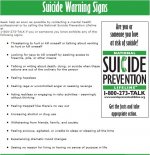David Baxter PhD
Late Founder
Recognizing the Signs of Suicide
Suicide can be prevented. In most cases, there are warning signs that someone is contemplating a suicide attempt. The most effective way to prevent suicide is to recognize the warning signs, take them seriously and know how to respond to them.
The warning signs are:
Be especially concerned if a person is exhibiting any of these warning signs and has attempted suicide in the past. According to the American Foundation for Suicide Prevention, between 20-50% of people who commit suicide have had a previous attempt.
What to do:
First, if someone you know appears to be depressed and is contemplating suicide, take them seriously. Listen to what he or she is saying. Take the initiative to ask him or her what they are planning, but don't attempt to argue them out of committing suicide. Rather, let the person know that you care and understand and are listening. Avoid statements like: "You have so much to live for."
Then seek help. Encourage the person to seek the help of a mental health professional. Because the person probably doesn't think they can be helped, you'll probably have to be persistent by going with him.
If your loved one appears to be in danger of committing suicide imminently, do not leave him or her alone; remove any weapons or drugs that may be used. Accompany him or her to the nearest emergency room.
During treatment, support your friend. Help them to remember to take antidepressant medications and to continue any other therapy prescribed.
Suicide can be prevented. In most cases, there are warning signs that someone is contemplating a suicide attempt. The most effective way to prevent suicide is to recognize the warning signs, take them seriously and know how to respond to them.
The warning signs are:
- Talking about suicide (killing one's self)
- Always talking or thinking about death
- Making comments about being hopeless, helpless, or worthless
- Saying things like "It would be better if I wasn't here" or "I want out"
- Depression (deep sadness, loss of interest, trouble sleeping and eating) that gets worse
- A sudden, unexpected switch from being very sad to being very calm or appearing to be happy
- Having a "death wish," tempting fate by taking risks that could lead to death, like driving fast or through red lights
- Losing interest in things one used to care about
- Visiting or calling people to say goodbye
- Putting affairs in order, tying up lose ends, changing a will
Be especially concerned if a person is exhibiting any of these warning signs and has attempted suicide in the past. According to the American Foundation for Suicide Prevention, between 20-50% of people who commit suicide have had a previous attempt.
What to do:
First, if someone you know appears to be depressed and is contemplating suicide, take them seriously. Listen to what he or she is saying. Take the initiative to ask him or her what they are planning, but don't attempt to argue them out of committing suicide. Rather, let the person know that you care and understand and are listening. Avoid statements like: "You have so much to live for."
Then seek help. Encourage the person to seek the help of a mental health professional. Because the person probably doesn't think they can be helped, you'll probably have to be persistent by going with him.
If your loved one appears to be in danger of committing suicide imminently, do not leave him or her alone; remove any weapons or drugs that may be used. Accompany him or her to the nearest emergency room.
During treatment, support your friend. Help them to remember to take antidepressant medications and to continue any other therapy prescribed.

 JAMA.pdf might also be a helpful resource.
JAMA.pdf might also be a helpful resource.
 ...
...